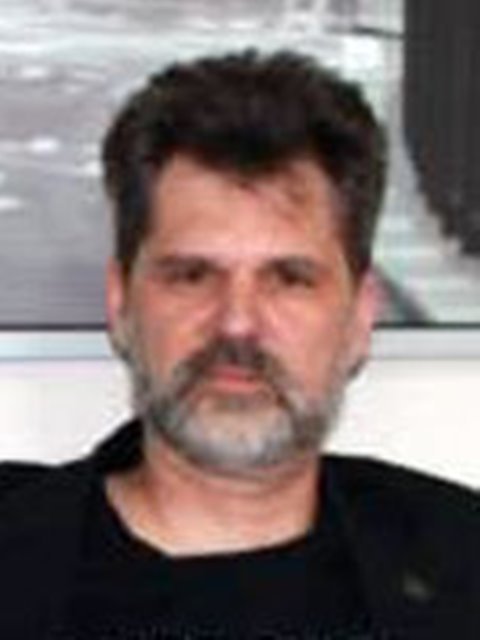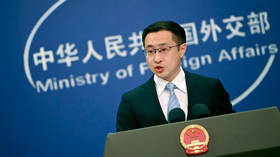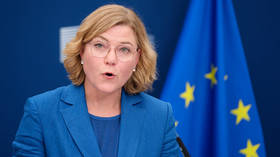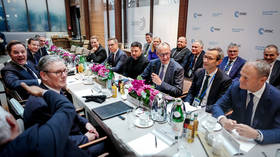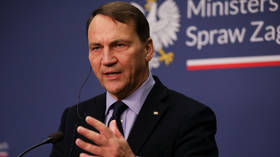The New Cold War: Libya, Syria, and the Ukraine
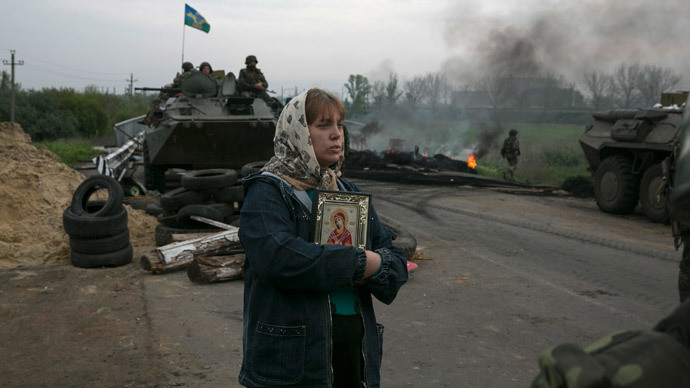
Syria's not-so-civil war has been going strong for more than three years now and recently the news agency Reuters reported that "[a]t least 150,000 people have been killed" in that time span.
The figure cited by Reuters is based on data provided by the Syrian Observatory for Human Rights. In spite of the fact that this source has been popping up all over the news media throughout the past three years, in the process receiving a veneer of academic impartiality and respectability, Reuters' Mohammed Abbas disclosed at the end of 2011, that the organization is basically run by one man, Rami Abdulrahman, from his "two bedroom terraced home in Coventry". Abbas describes Abdulrahman as "a Sunni Muslim" opposed to the Assad regime in Damascus. In fact, Abdulrahman explained his position in the following terms: "I came to Britain the day Hafez al-Assad died, and I'll return when Bashar al-Assad goes". Hence, the Syrian Observatory for Human Rights can hardly be seen as an impartial source providing accurate data. Instead, it appears it is a propaganda outfit frantically feeding anti-Assad messages into the global news stream.
Even though the ostensible object of the armed conflict in Syria was (or is) to remove Bashar al-Assad from power, it seems abundantly clear that the reality of the conflict on the ground has been nothing but a proxy-war pitting the West, as represented by the US and its NATO and other allies, against the new unholy trinity of Russia-China-Iran. Over the past months, however, this straightforward narrative has changed ever so drastically that now the erstwhile war-on-terror has seeped into Syrian territory and the name al-Qaeda has now assumed the shape of Islamists opposing the Damascus regime and frightening western observers and leaders alike. As such, this line of argument has some time ago received unexpected confirmation by one of Europe's senior political leaders: the French lawyer and politician Roland Dumas (serving as François Mitterrand's Foreign Minister from 1984 to 1986 and again from 1988 to 1993) made a cable television appearance last year -- on the French channel LCP or La Chaîne Parlementaire -- where he said the following: "I’m going to tell you something. I was in England two years before the violence in Syria on other business [, corresponding to 2009]. I met with top British officials, who confessed to me that they were preparing something in Syria. This was in Britain not in America. Britain was organizing an invasion of rebels into Syria. They even asked me, although I was no longer minister for foreign affairs, if I would like to participate. Naturally, I refused, I said I’m French, that doesn’t interest me". Dumas went on to say "that this operation goes way back. It was prepared, preconceived and planned [interrupted by the show's host, Arnaud Ardoin] ... in the region it is important to know that this Syrian regime has a very anti-Israeli stance". If Dumas' statement bears any relation to reality that would mean that Gordon Brown's government was ultimately behind any master-plan to remove the Assad regime, and that would transform Gordon Brown into Tony Blair's real successor, in more than one way -- both are after all members of the parliamentary group Labour Friends of Israel.
But seen on a global scale, even though Dumas emphatically stressed that the plan was hatched "in Britain not in America", it is obvious that Blair and Brown have always been more than willing lackeys of the White House. As convincingly argued for by Norman Finkelstein in his polemic book The Holocaust Industry, the US has been Israel's main support and financial backer since the June 1967 ‘Six Day War', as a regional doorstop against Soviet ambitions in the Middle East, and thus it would seem very unlikely indeed that Britain had been acting on its own in 2009. And in today's world of inter-related and cross-pollinated alliances and interests, an Israeli reasoning would not necessarily negate the fact that Syria was planned as a proxy-battlefield where the New Cold War could be contested. And in this context, a speech given by retired Gen. Wesley Clark (Retired 4-star U.S. Army general, Supreme Allied, Commander of NATO during the 1999 War on Yugoslavia) at the public affairs forum the Commonwealth Club of California in San Francisco on 3 October 2007 appears most enlightening.

At the time the retired 4-star general was promoting his then newly published book A Time to Lead: For Duty, Honor and Country, and during his talk in California he reminisced about the state of the US under the Bush-Cheney Administration (2001-09). Wesley Clark quite naturally talked about the impact of 9/11, the terrorist attacks of 11 September 2001 that have since determined the course of the world. Clark literally stated that following the terrorist attacks there "was a policy coup ... these people took control of policy in the United States”, referring to the Bush-Cheney Administration and the Neo-con cabal, known as the Project for the New American Century or PNAC (including such luminaries as Richard Armitage, John R. Bolton, Dick Cheney, Francis Fukuyama, Donald Rumsfeld, and Paul Wolfowitz). Continuing his talk, Gen. Clark added how he had been talking to an unnamed officer following 9/11, who told him of the US plan to invade Iraq in response. During the US invasion of Afghanistan, the general and the unnamed officer met again, and the officer told him about the government’s plans to invade not only into Iraq, but to “take out seven countries in five years, starting with Iraq, and then Syria, Lebanon, Libya, Somalia, Sudan and, finishing off, Iran.” The retired general next recalled a meeting with then-Under Secretary of Defense Paul Wolfowitz in March 1991. At that stage, the men engaged in an exchange about Operation Desert Storm (17 January 1991 – 28 February 1991), when the Under Secretary said that the First Gulf War had taught the US "that we can use our military without being challenged ... We’ve got about five, ten years to clean up the Soviet client regimes before another", referring specifically to Syria, Iran, and Iraq as these ex-Soviet "client regimes". And the fact that these states are all populated by Muslims was not coincidental either.
Pre-emption tactics
In other words, the above testimonies would indicate that the end of the Cold War, beginning with the Fall of the Berlin Wall (9 November 1989) and ending with the dissolution of the Soviet Union (8-25 December 1991), led the US to assume that might is indeed right and that future rivals should be pre-empted – in this way, the administration of Bush, Sr., prefigured the shape of things to come under Bush, Jr.
President George W. Bush’ National Security Strategy (NSS), issued 20 September 2002, was famously built around the concept of "preemption", defined as "preemptive and preventive action". In view of the fact that the military-industrial complex' wheels are in dire need of perpetual movement, in order to grease the engine of commerce and fill the bank accounts of the corporations running the show, the Bush concept of "preemption" gave rise to the War On Terror.
Wolfowitz' 1991 list of "client regimes" consisted of Middle-Eastern states, important to the world's energy supplies and part of the Islamic world. Following the end of the Cold War, the US and NATO was suddenly left without an apparent and identifiable enemy. But luckily, after having spent a little more than three years in this desert of disorder, in February 1995, the then-NATO Secretary General Willy Claes announced that a new clear and present danger to the West had been identified, stating at an international conference in Germany that “Islamic militancy has emerged."
Claes added that extremist Muslims oppose “the basic principles of civilization that bind North America and Western Europe.” The then-NATO secretary-general was nevertheless diplomatic enough to remark that his declaration should not be seen as a call for “a crusade against Islam”. Nevertheless, Willy Claes had let the genie out of the bottle, and, in combination with the Bush concept of "preemption", this led to the War-on-Terror, seen and understood by many as war against Islam, irrespective of whatever assurances to the contrary had previously been made by the one-time NATO secretary-general.

New beginning
Still, Islamic fundamentalism or Islamic militancy was but a loose term, an intangible entity that could take many shapes and forms and would thus be hard to identify and eliminate. The Chicago Tribune's chief European correspondent Ray Moseley, at the time, remarked that "there is no commonality of purpose conceivable among the Arab nations of the Middle East and North Africa, even if fundamentalists were to come to power in all of them. The political and cultural differences among them are deep-rooted, and anyone who imagines an Islamic monolith launching a Muslim version of the Crusades is simply ignorant of history". After approximately six and a half years of this nagging uncertainty, "9/11" happened and the US was presented with a "new Pearl Harbor" that was cunningly exploited by George W. Bush to proclaim a War-on-Terror against al-Qaeda. As a result, the West became heavily embroiled in the "wider" Middle East – from Afghanistan to Iraq, from Yemen to Libya, and from Somalia to Kyrgyzstan. The War On Terror was renamed Overseas Contingency Operations, keeping the Cold War work ethic and practice alive. In fact, "[s]ince the turn of the 21st century, the United States has begun to pump more money into defense", as expressed by the Washington Post and confirmed by Professor Kenneth Flamm, the Dean Rusk Chair in International Affairs in the Lyndon B. Johnson School of Public Affairs at the University of Texas at Austin, when he said that the "relative stability of US defense industrial output contradict the prevailing forecasts as the Cold War wound down."
The Cold War was based on the concept of containment, which led to amassing huge stockpiles of weapons of mass destruction and the financing of proxy-conflicts, whereas in the early 21st century, the War On Terror renamed Overseas Contingency Operations by the Obama administration is fought more pro-actively by means of drone strikes and secretive armed interventions by the Joint Special Operations Command (JSOC), as revealed by the investigative journalist Jeremy Scahill.
Still, apparently as a result of the so-called Arab Spring (or Arab Awakening, if you'd prefer Al Jazeera's coinage), at the dawn of the new century's second decade, a veritable proxy-conflict is now being waged in Syria's not-so-civil war. Following Tunisia’s Jasmine Revolution in January 2011 the events in Egypt, which sparked the wave of protests throughout the Arab world, appear to have been orchestrated rather than being a completely spontaneous uprising, or at least that is what WikiLeaks' Cablegate files seem to suggest.
In Libya the brutal end of Colonel Muammar Gaddafi and his regime (23 August 2011) at the hands of the armed opposition, with liberal help from the US and NATO, appears like a textbook case of a military intervention. NATO’s air support of Libya’s rebels effectively turned the uprising into an “Assisted Rebellion” against an old foe of the West (harking back to the bygone days of President Ronald Reagan), even though Gaddafi had for some time been on the road to rehabilitation. The reality is however that the Libyan intervention was nothing but a Resource War according to the Global Trade Atlas, published by the International Energy Agency (IEA), in calendar year 2010, 28% of Libya’s oil exports went to Italy, 15% to France, and 10% to Spain and Germany each. The US received only 3% of Libya’s exports. In addition, Kevin Hall of McClatchy Newspapers points out that a confidential cable released by WikiLeaks reveals that the US pressurized Italy's Silvio Berlusconi to eradicate a deal between Italy’s partly state-owned ENI and Russia’s Gazprom, a deal that would have given Vladimir Putin access to Libyan oil and an even greater share of the European market. Falling short of directly linking NATO’s air war in Libya with the US desire to curtail the Gazprom nation that is Russia, Hall nevertheless asserts that there is a certain “correlation” between these two factors.
In other words, as McClatchy's Kevin Hall ever so slightly seems to suggest, the Libyan intervention was the conflict that transformed the War-on-Terror renamed Overseas Contingency Operations into the New Cold War, a contest between the US (and its NATO allies) and the new emerging power-houses of the 21st century, Russia and China (even though the latter appears to keep its distance lately).
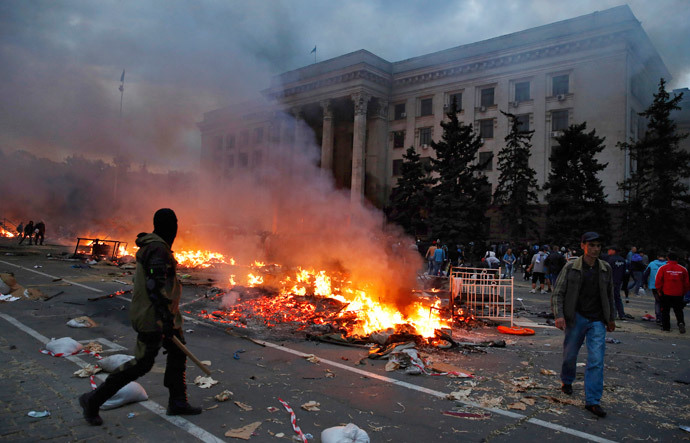
After all, Russia has long-standing ties with Syria. In 2011, when Syria's not-so-civil war first broke, the Russian navy was planning to refurbish the Soviet port of Tartus on Syria's coastline. In 2010, the Chinese news agency Xinhua reported that “Russia did not exclude the possibility of building naval logistic facilities in Socotra Island, Yemen, as well as in Tripoli, Libya”. The conveniently timed eruption of the Arab Spring all but thwarted Putin's designs to establish footholds in the Mediterranean, a Russian desire since the reign of Peter the Great in the early 18th century. Russian bases in Syria, Libya, and Yemen would have lent a logistical dimension to Moscow’s designs "to oppose a tangible American presence in the Arab world". Whereas Russia plans with regard to the Red Sea and the Gulf of Aden were shattered by the CIA "building a secret air base in Yemen to serve as a launching pad for armed drone strikes". As a result, the outbreak of Syria's not-so-civil war set the scene for the first real proxy-war of this century.
The opposition to Bashar al-Assad's Ba'ath regime has received Western backing from the very start, with Saudi Arabia, Qatar, and NATO-member Turkey acting as the conduits for the Obama administration. Iran, China, and Russia, on the other hand, have been eager supporters of Damascus. The conflict is now in its third year, and due to Russia's skillful diplomatic intervention (securing the removal of the government's chemical weapons stocks), a direct military strike on Damascus has been averted, allowing Assad's forces to slowly regain the upper-hand against his armed opponents. As a result, this battleground for the New Cold War is at a stalemate, a situation which seems unlikely to produce any lasting results in the short term. The complicated nature of the Syrian conflict means that the area can no longer function as a proxy-war zone for the New Cold War, and as a result of the ongoing crisis in the Ukraine (which started in November 2013), one can see that the ideological contest between the West and Russia has now moved to the very edge of Europe.
The Ukraine crisis came into its own when the democratically-elected President of Ukraine, Viktor Yanukovich, was forced to flee the country and seek refuge in Russia (he left Kiev during the night of 21 February 2014). The EU relies on Russia, the 'Gazprom Nation', for about 20% of its gas needs, and, significantly, about 80% of that comes via the just-mentioned three pipelines crossing the Ukraine. The price of gas is of course a geo-political factor of the greatest importance, and in this instance, the BBC wisely opined that "some Western commentators [at the time] said [that] Russia was trying to punish [the Ukraine] for attempting to withdraw from Moscow's sphere of influence and to strengthen ties with the European Union and NATO". The subsequent Russian annexation of the Crimea, following a popular referendum indicating that the majority of the population was in favor of a return to the Russian homeland, exacerbated the tense relations with the West. But in fact, the Crimean peninsula had actually been part of the Russian sphere ever since it was annexed by Empress Catherine the Great in 1783, an annexation which turned the Black Sea into a Russian lake. Then nearly two centuries later, in 1954, the Soviet leader Nikita Khrushchev transferred the peninsula from the Russian Soviet Federative Socialist Republic to Ukraine, with the Russian Black Sea Fleet remaining stationed in the Crimea. And now, once again, the Crimea is part of the Russian Federation.
At the moment, the heavily pro-Russian eastern region of the Ukraine is the focus of the world's media and scene of a bloody conflict, a confrontation between Ukraine's central government and pro-Russian Ukrainian rebels that functions as the latest proxy-battle in the New Cold War - a contest that is shaping up to determine the outlook of the 21st century. The situation in eastern Ukraine is turning more and more violent every day, particularly now that elections have been scheduled to be held on 25 May. Russia, however, doubts that free and fair elections can be held in the Ukraine under present circumstance. Whether reason will prevail and President Obama sit down with President Putin to come to an agreement that would satisfy most, if not all, parties in the conflict, is still to be seen.
The statements, views and opinions expressed in this column are solely those of the author and do not necessarily represent those of RT.
The statements, views and opinions expressed in this column are solely those of the author and do not necessarily represent those of RT.
